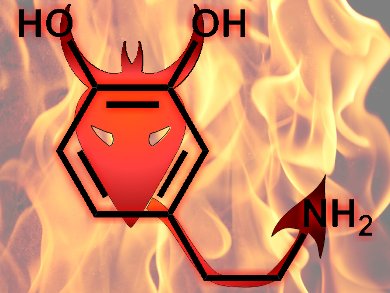Hormone From Hell?
Dopamine is a small molecule. C8H11NO2. 4-(2-aminoethyl)benzene-1,2-diol. Nothing too complicated really. Two neighboring hydroxy groups on a benzene ring with an amino group just around the corner. But, oh! What a molecule. It is a neurotransmitter produced in various parts of the brain and has five known target receptors. According to the Wikipedia entry for the compound: “Its main function as a hormone is to inhibit the release of prolactin from the anterior lobe of the pituitary.” But, that belies a whole host of issues for which dopamine is responsible. Dopamine, after all, has a role to play in behavior and cognition, in voluntary movement, in motivation, in our level of concentration, working memory, learning, sleep patterns, our moods, sexual gratification, punishment, and, of course, reward.
Reward
We all know it when we receive it. It’s that most pleasurable feeling, that emotion that drives us. Well, drives us to what exactly? One might say that biochemically speaking the firing of dopaminergic neurons and the release of this rewarding chemical, dopamine, is what motivates us in so many areas of our lives. Look at that short list of behaviors again. It almost says it all. What else is there to living than the entries in that list? Mood, motivation, movement, sleep, sex … reward.
Of course, the close association between feelings of reward and our urges to seek it out was hard-wired by evolution millions of years ago. The things that reward us are the things we need for survival and successful reproduction. But, there is a thin dividing line between reward-seeking behavior for survival and raising offspring and what one might consider unwarranted consumption and addiction. Anticipation of reward and the effect those firing dopaminergic neurons have on our feelings seem to be the key. More importantly, though, just as all the signals from our various senses are ultimately electrochemical in nature, once you get beyond the input to the sense organ, the reward comes not from the activity or the substance being consumed, it comes from dopamine alone. The biochemistry of dopamine is the reward.
Addiction
If you are addicted, then apparently you are not addicted to the substances and activities you crave, nor to the nicotine of cigarette smoke, the thrill of the roulette wheel, the gratification of sex, nor to the feelings of power. You are, in fact, addicted to the dopamine and its effects. From this notion, it seems obvious that one could imagine addiction in every single walk of life, not just the common addictions with which so many people are familiar: alcohol, nicotine, heroin, gambling, sex, even chocolate, to recap from an earlier issue of the magazine. But, also to those behaviors that give their actors the dopamine reward, whether that’s the quest for ever greater riches way beyond any individual’s personal needs, political and other forms of power, religious ardor even, and the global problems they have wrought throughout the centuries. They all come back to that rewarding neurotransmitter. In some sense, it all reduces to that small molecule, that dopamine.
This does raise one rather curious question though, if all these things we crave simply plug into our dopamine reward system, then why is it so difficult for a chocoholic to stop eating chocolate and take up jogging instead? Surely, they will both trigger the desired dopamine release? Well, the whole issue of anticipating and receiving the reward is tied in at a subconscious level as we learn to associate a particular stimulus, eating chocolate say, with the reward. It is possible to get the same buzz from jogging as others do from chocolate. But, switching between the two and getting the same anticipation and buzz is difficult. Particularly for some of us, with regard to abandoning chocolate and choosing to jog instead.
Image: © Heulwen Price/Wiley-VCH
This article was inspired by a question addressed to me via Twitter from Charles Faraone, the owner of a site called the Dopamine Project, who wanted to know why medical science was not inclined to investigate the role of dopamine in humanity’s addiction to money, power, fear, approval, and self-esteem.
Also of interest :
- The Good And The Bad News for Chocolate Fans
As with any vice — Bieber, brews, or bars of chocolate — those who partake to excess will have a trove of excuses - Other articles on addiction
- All research highlights





There is another way of looking at the dopamine issue, that has physiological evidence from studies with monkeys. Addiction may not be about the dopamine reward but about the anticipation of that reward. US neurologist Robert Sapolsky explains the difference. It’s the uncertainty of the reward that drives behaviour and for humans that reward anticipation can last on the short timescale of slot machines at Las Vegas to the decades long anticipation of heaven’s unearthly estate for many. I’d posted the video on the Sciencebase blog: http://www.sciencebase.com/science-blog/dopamine-reward-addiction-anticipation.html